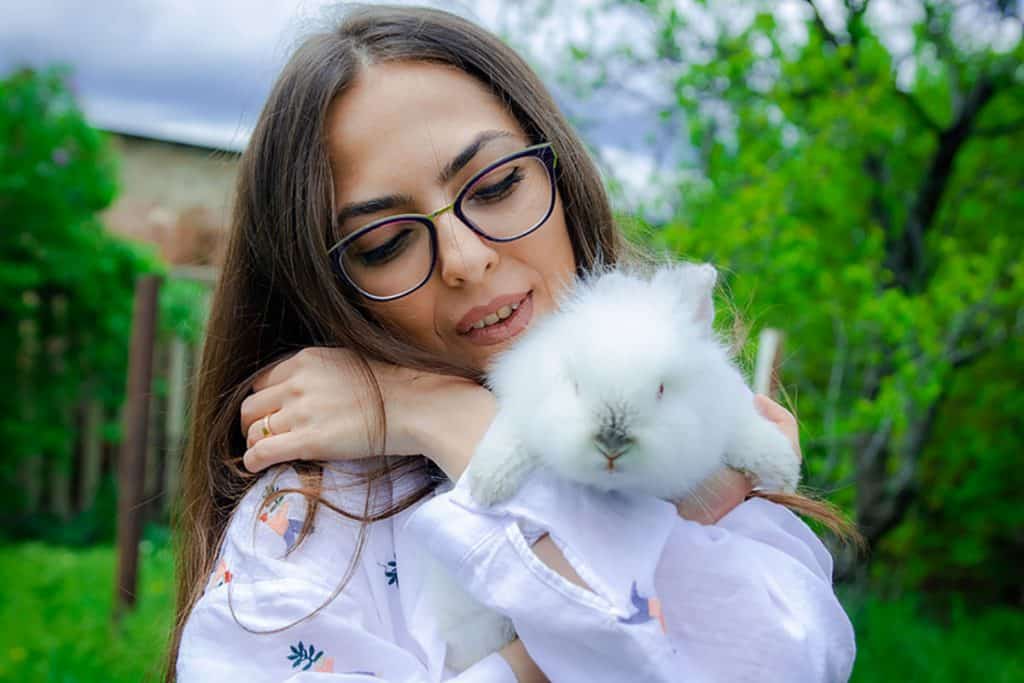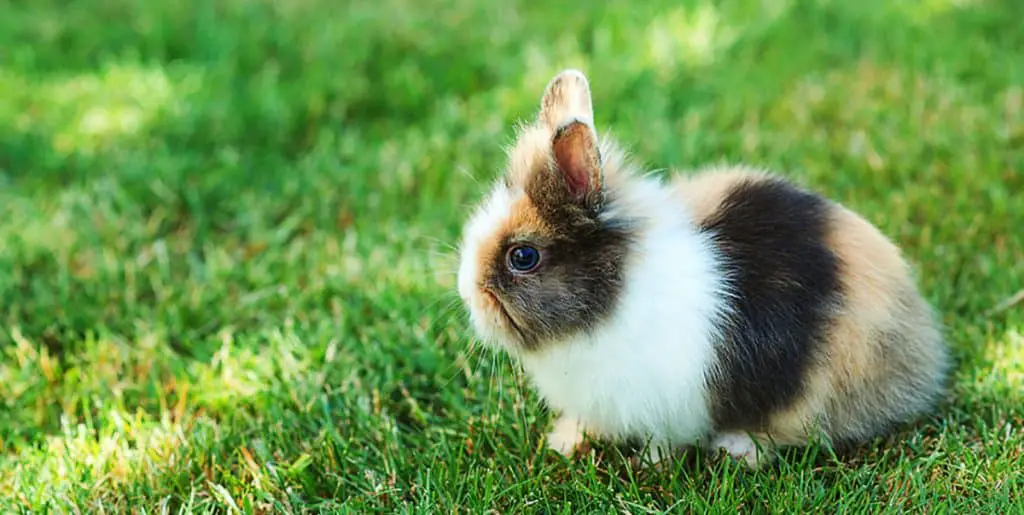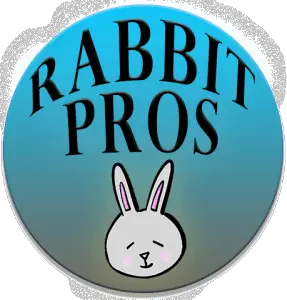Disclosure: We may earn money or products from the companies mentioned in this post.
Having served rabbits and their owners as a veterinarian for 15 years, I’ve had countless people ask about their rabbit vomiting or throwing up. In this article, I’m going to dig into that subject and set the record straight about rabbits vomiting.
Rabbits are not able to vomit. The design of the rabbit’s digestive system makes the act of vomiting impossible. The lack of ability to vomit makes many situations such as toxicities and hairballs very dangerous for pet rabbits.
When we, as humans, are ill or eat something that disagrees with us, our bodies can purge bad food, toxins, and viruses by vomiting. Though unpleasant, this can be lifesaving.
On the other hand, rabbits cannot vomit, and everything they ingest stays in their gastrointestinal tract until it exits as feces. This can pose a significant danger to a rabbit that eats something dangerous.
Bunnies Choking or Gagging
Bunnies occasionally choke or gag and rabbit parents sometimes mistake this for vomiting which it is not. Bunnies can gag if they eat too fast, especially if fed stale or too dry pellets but it can also be caused by more serious respiratory infections (snuffles, pneumonia) and heart disease.
To avoid your rabbit gagging or choking be sure to store your rabbit pellets properly, keeping them dry and pest-free.
A bunny that makes any coughing, choking, or gagging sound for more than a few moments should be seen by their veterinarian. Likewise, a bunny that often makes those should be seen by their veterinarian to screen for more serious health issues.

Why Can’t Rabbits Throwup?
Many anatomic and physiologic studies have looked at the reasons why rabbits cannot vomit.
In the past, it had been theorized that they might be like rodents, who cannot vomit due to weak stomach and diaphragm muscles, but this is not the case.
Rabbits, like horses, possess a very strong esophageal sphincter that tightly closes and prevents ingesta (food and water) from exiting the stomach and going back up the esophagus to the mouth.
This super-strong sphincter is found in single-stomached animals that graze continuously and have significant amounts of feed material in their stomachs, making the stomach full and enlarged much of the time. The purpose of this sphincter is to prevent stomach acids in the full stomach from entering the esophagus and causing damage to the lining.
For added protection, the esophagus enters the stomach at an angle that acts to prevent backflow, and the entrance to the stomach is surrounded by a thick fold of tissue acting as a one-way barrier. All these anatomical structures work together to prevent rabbits from vomiting.
Does My Bunny Need to Vomit?
Rabbits do not need to vomit, as it is not in their typical nature to do so.
However, a rabbit’s digestive system was designed for a life in the wild where the rabbit would be continuously grazing all day on fresh, green grasses and where they would get plenty of exercise hopping all day. This way of life keeps the digestive systems of wild rabbits regular and avoids gas, slow-moving intestines, blockages, and constipation.
Keeping a rabbit in captivity and feeding a dry, commercial diet poses numerous challenges to their gastrointestinal system. Captivity also sometimes brings unforeseen dangers in the form of toxins and other things a rabbit should not ingest.
For an animal that cannot purge itself of anything once eaten, great care must be taken as everything that enters must pass through its entire digestive tract.
For this reason, rabbits are very prone to accidental toxicities when they are either fed or get into something they should not eat. Inappropriate diets can lead to slow-moving intestines (gastrointestinal stasis) and bloat from the trapped gas. Sometimes rabbits in captivity will also suffer from hairballs blocking their intestinal tract.

What Should I NOT Let My Bunny Eat?
As veterinarians, a vast majority of the emergencies we see are pets who have eaten something they shouldn’t have.
But when it comes to rabbits, toxin ingestions are even more dangerous because gastrointestinal decontamination is much more difficult in a species that cannot vomit.
Often, in other species, vomiting is not only the first sign alerting pet parents that something is amiss, but it is also the animal’s way of clearing the toxin or offending substance from their body. Unable to do this, rabbits are often very sick before their owners realize and make an appointment with their veterinarian.
Several things can pose a health risk to your bunny, including plants inside and outside your home. For a list of toxic plants, as well as plants that are safe to feed your bunny, please visit FirstVet.com.
It is essential that you keep all rat poisons, weed killers, and pesticides far away from your pet rabbit.
Rat poison is often manufactured in pellets and blocks flavored and scented to be attractive to small animals, and it only takes a small amount to have fatal consequences to your pet bunny.
Many weed killers contain poisons that are highly toxic to rabbits, so great care must be taken to ensure grass grazed on or fed to rabbits has not been sprayed with these lawn chemicals.
Lastly, many pesticides, those used in the home, outdoors, and on other species for flea control, can have serious adverse health consequences for rabbits. Rabbits should be kept away from all these substances, and if any parasite control is needed for a rabbit, a veterinarian should always be consulted.
Rabbits And Hairballs
As we have covered, rabbits’ inability to vomit can lead to gastrointestinal issues if they ingest anything that makes them sick. But being unable to clear things from their stomachs can also lead to other digestive problems such as intestinal blockages and constipation.
One common cause of intestinal blockage is hairballs. Like cats, rabbits use their tongues to groom themselves.
Rabbits can’t vomit, which means if they swallow too much fur when grooming themselves, they can form hairballs.
Hair licked off and inadvertently swallowed is typically passed through a healthy rabbit’s digestive system. However, improper diets can lead to slower digestion and the build-up of foodstuffs in the rabbit’s gastrointestinal system, which then causes hair to become stuck along the digestive tract.
These hairballs can become large enough that they form an intestinal blockage, resulting in severe illness. Usually, an otherwise healthy rabbit will not suffer from hairballs, even if they ingest a lot of fur. But if their digestion slows down a little, it will cause the fur to get backed up and start to clog the digestive system.
Signs Your Rabbit Has A Hairball
A rabbit having trouble with hairballs may appear lethargic, be unwilling to eat, pass large amounts of fur in their feces, have a significant reduction in the amount of feces they pass, and lose weight. If you suspect your rabbit is having a hairball issue, take her to your veterinarian right away for prompt treatment.
Luckily, most hairballs can easily be prevented with thorough brushing, regular exercise, and a healthy diet.
How Veterinarians Treat Bunny Stomach Issues
If your bunny has ingested a toxin or has a blockage from a hairball, it is imperative that you seek veterinary help right away. Rabbits can be somewhat fragile creatures when ill and need proper treatment.
Rabbits will often hide that they are sick as an evolutionary defense mechanism designed to keep them from appearing as easy prey to predators. Unfortunately, this behavior can lead to a situation where the rabbit is already quite ill before an owner notices. Quick action is necessary.
If your rabbit has eaten something toxic or has an intestinal blockage caused by a hairball or something else, your veterinarian will run diagnostic tests such as blood work and x-rays to determine what is making your pet sick. Depending on the issue, the rabbit may require intravenous fluids, medications, or surgery.
Be prepared to provide as much information as possible since your bunny cannot talk.

Rabbits are amazing creatures that make great pets. Rabbits can live long and happy lives with proper diet and care, providing years of companionship to their owners.
However, it is important to remember that keeping a rabbit in captivity is a change from their natural habitat. Grooming and exercise requirements must be addressed.
Special consideration should also be given to their unique dietary needs, and an owner must be cautious to keep all toxins out of reach. If any signs of ill health are noticed, the rabbit should be taken to a veterinarian immediately.
~Dr. Jamie Whittenburg DVM
